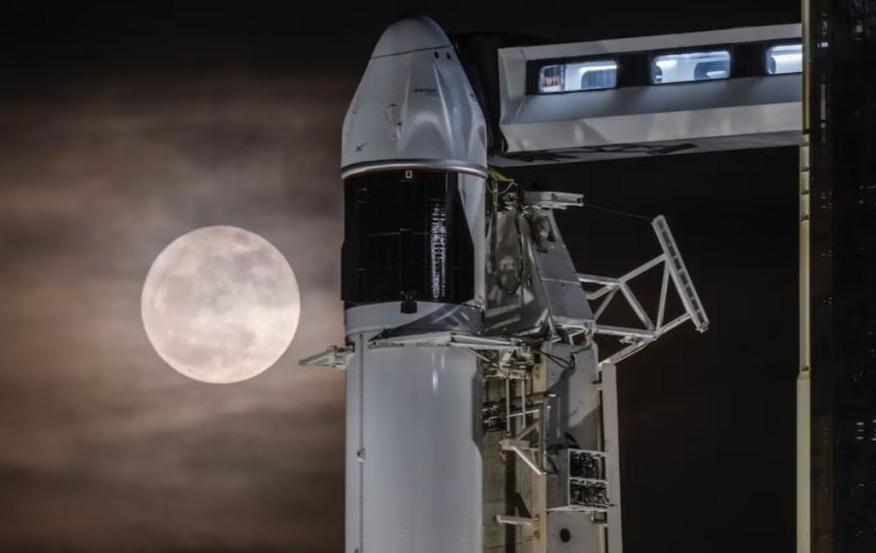
Pichai, Musk & Bezos competing to establish data centres on Moon: Report
In a surprising turn of events, three of the world’s most influential tech moguls, Sundar Pichai, Elon Musk, and Jeff Bezos, are reportedly exploring the possibility of establishing data centers on the Moon. According to a recent report by the Wall Street Journal, these tech giants are drawn to the Moon’s stable environment and low temperatures, which could significantly reduce cooling costs for servers.
The idea of storing and processing data on the Moon may seem like the stuff of science fiction, but it’s an concept that’s gaining traction among tech industry leaders. The Moon’s surface offers a unique combination of advantages that make it an attractive location for data centers. For one, the Moon’s stable environment means that data centers can be built without the risk of natural disasters such as earthquakes, hurricanes, or floods, which can be devastating to data centers on Earth.
Another significant advantage of the Moon is its low temperatures. Certain regions on the Moon’s surface can drop to as low as -243°C, making it an ideal location for cooling servers. Cooling is a major expense for data centers, as it requires a significant amount of energy to keep servers at a stable temperature. By leveraging the Moon’s natural cold temperatures, data centers can significantly reduce their cooling costs, making them more efficient and cost-effective.
The Moon’s open land also offers the possibility of building huge facilities without the environmental concerns faced on Earth. On our planet, data centers are often built in areas with limited space, and their construction can have a significant impact on the local ecosystem. In contrast, the Moon’s surface is largely uninhabited, making it an ideal location for large-scale data center construction.
So, what’s driving the push to establish data centers on the Moon? For one, the increasing demand for data storage and processing is driving the need for more efficient and cost-effective solutions. As more and more devices become connected to the internet, the amount of data being generated is growing exponentially. This has created a need for more data centers, which are essentially large buildings that house servers, storage systems, and other equipment necessary for data processing and storage.
Another factor driving the push to establish data centers on the Moon is the growing importance of edge computing. Edge computing refers to the practice of processing data closer to the source, rather than in a centralized location. By establishing data centers on the Moon, tech companies can process data in real-time, reducing latency and improving the overall performance of their applications.
The competition between Pichai, Musk, and Bezos to establish data centers on the Moon is likely to be fierce. Each of these tech moguls has a significant stake in the tech industry, and establishing a data center on the Moon could give them a significant advantage over their competitors. Pichai, as the CEO of Alphabet, the parent company of Google, has a strong interest in establishing a data center on the Moon, given Google’s significant investments in cloud computing and artificial intelligence.
Musk, as the CEO of SpaceX, has a unique advantage in the competition to establish data centers on the Moon. SpaceX has already developed a significant capability in space transportation, and Musk has announced plans to send both crewed and uncrewed missions to the Moon in the near future. By leveraging SpaceX’s capabilities, Musk could potentially establish a data center on the Moon ahead of his competitors.
Bezos, as the founder of Amazon and Blue Origin, also has a significant stake in the competition to establish data centers on the Moon. Amazon is one of the world’s largest cloud computing providers, and establishing a data center on the Moon could give the company a significant advantage in terms of latency and performance. Blue Origin, Bezos’ space exploration company, has also developed a significant capability in space transportation, and could potentially be used to transport equipment and personnel to the Moon.
In conclusion, the competition between Pichai, Musk, and Bezos to establish data centers on the Moon is an exciting development that could have significant implications for the tech industry. The Moon’s stable environment, low temperatures, and open land make it an attractive location for data centers, and the potential benefits of establishing a data center on the Moon are significant. As the tech industry continues to evolve, it will be interesting to see how this competition plays out, and which company will ultimately establish the first data center on the Moon.






